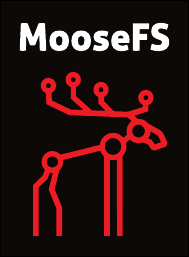https://github.com/moosefs/docker-volume-moosefs
Docker Volume Plugin for MooseFS to create persistent volumes in Docker containers
https://github.com/moosefs/docker-volume-moosefs
docker docker-volume-plugin moosefs persistent-storage storage
Last synced: 20 days ago
JSON representation
Docker Volume Plugin for MooseFS to create persistent volumes in Docker containers
- Host: GitHub
- URL: https://github.com/moosefs/docker-volume-moosefs
- Owner: moosefs
- License: gpl-2.0
- Created: 2018-04-09T06:16:28.000Z (about 7 years ago)
- Default Branch: master
- Last Pushed: 2023-03-10T13:45:58.000Z (about 2 years ago)
- Last Synced: 2025-04-06T00:11:14.377Z (about 1 month ago)
- Topics: docker, docker-volume-plugin, moosefs, persistent-storage, storage
- Language: Go
- Size: 12.7 KB
- Stars: 25
- Watchers: 8
- Forks: 5
- Open Issues: 3
-
Metadata Files:
- Readme: README.md
- License: LICENSE
Awesome Lists containing this project
README
# Docker Volume Plugin for MooseFS
Plugin for MooseFS to create persistent volumes in Docker containers.

## Version history:
- 0.2.0 Creates new subdirectory for each volume in root e.g. /mnt/moosefs
- 0.1.0 Mountpoint /mnt/moosefs is used as the volume
## Preconditions
- **MooseFS** Storage Cluster has to be setup and running
- **MooseFS** Client should be installed on host machine
- **MooseFS** is mounted in one of host directories
## Installation
We provide pre-built binary **rpm** and **deb** packages available from the [releases](https://github.com/moosefs/docker-volume-moosefs/releases) page. You can download them and go to **installation** for your OS.
### RedHat/CentOS
Pre-built **rpm** package can be downloaded from [releases](https://github.com/moosefs/docker-volume-moosefs/releases) or can be built with following commands:
```
make rpm-deps
make
make rpm
```
**Installation**
Install and start the service:
```
yum localinstall docker-volume-moosefs-$VERSION.rpm
systemctl start docker-volume-moosefs
```
**Deb** package can be also build using following command:
```
make deb
```
### Debian
Pre-built **deb** package can be downloaded from [releases](https://github.com/moosefs/docker-volume-moosefs/releases) or can be built with following commands:
```
make deb-deps
make
make deb
```
**Installation**
Install and start the service:
```
dpkg -i docker-volume-moosefs_$VERSION.deb
systemctl start docker-volume-moosefs
```
**Rpm** package can be also build using following command:
```
make rpm
```
## Usage example
Assuming we have **MooseFS** mounted in `/mnt/moosefs` we will create a volume labeled `mymoosefs`:
```
docker volume create -d moosefs --name mymoosefs -o root=/mnt/moosefs
```
Without specified mountpoint plugin will assume mounting in `/mnt/moosefs/$NAME`, so **mymoosefs** will be mounted in `/mnt/moosefs/mymoosefs`
We can use shorter command: `docker volume create -d moosefs --name mymoosefs`
We can inspect created volume with following command:
```
docker volume inspect mymoosefs
```
Now we can use our `mymoosefs` **MooseFS Volume** in example container such as Nginx. Following command will mount our storage to `/usr/share/nginx/html` directory, where nginx stores html files. We are forwarding port 80 from container to [http://localhost:10080](http://localhost:10080). This command will start Nginx in container:
```
docker run -ti -v mymoosefs:/usr/share/nginx/html -p 10080:80 nginx:latest bash -c "service nginx start; bash"
```
Now we can check that Nginx created two html files in `/mnt/moosefs`:
```
ls /mnt/moosefs
50x.html index.html
```
These file will still exist in MooseFS, after shutting down the container or removing volume.
To remove the volume (note that this will ***NOT*** remove the actual data):
```
docker volume rm mymoosefs
```